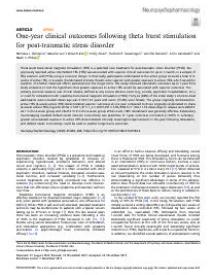One-year clinical outcomes following theta burst stimulation for post-traumatic stress disorder
Theta burst transcranial magnetic stimulation (TBS) is a potential new treatment for post-traumatic stress disorder (PTSD). We previously reported active intermittent TBS (iTBS) was associated with superior clinical outcomes for up to 1-month, in a sample of fifty veterans with PTSD, using a crossover design. In that study, participants randomized to the active group received a total of 4-weeks of active iTBS, or 2-weeks if randomized to sham. Results were superior with greater exposure to active iTBS, which raised the question of whether observed effects persisted over the longer-term. This study reviewed naturalistic outcomes up to 1-year from study endpoint, to test the hypothesis that greater exposure to active iTBS would be associated with superior outcomes. The primary outcome measure was clinical relapse, defined as any serious adverse event (e.g., suicide, psychiatric hospitalization, etc.,) or need for retreatment with repetitive transcranial magnetic stimulation (rTMS). Forty-six (92%) of the initial study’s intent-to-treat participants were included. Mean age was 51.0 ± 12.3 years and seven (15.2%) were female. The group originally randomized to active iTBS (4-weeks active iTBS) demonstrated superior outcomes at one year compared to those originally randomized to sham (2-weeks active iTBS); log-rank ChiSq = 5.871, df = 1, p = 0.015; OR = 3.50, 95% CI = 1.04–11.79. Mean days to relapse were 296.0 ± 22.1 in the 4-week group, and 182.0 ± 31.9 in the 2-week group. When used, rTMS retreatment was generally effective. Exploratory neuroimaging revealed default mode network connectivity was predictive of 1-year outcomes (corrected p < 0.05). In summary, greater accumulated exposure to active iTBS demonstrated clinically meaningful improvements in the year following stimulation, and default mode connectivity could be used to predict longer-term outcomes.
Geachte bezoeker,
De informatie die u nu opvraagt, kan door psychotraumanet niet aan u worden getoond. Dit kan verschillende redenen hebben,
waarvan (bescherming van het) auteursrecht de meeste voorkomende is. Wanneer het mogelijk is om u door te verwijzen naar de bron
van deze informatie, dan ziet u hier onder een link naar die plek.
Als er geen link staat, kunt u contact opnemen met de bibliotheek,
die u verder op weg kan helpen.
Met vriendelijke groet,
Het psychotraumanet-team.
In: Neuropsychopharmacology ISSN: 0893-133X | 45 | 940-946
https://doi.org/10.1038/s41386-019-0584-4


